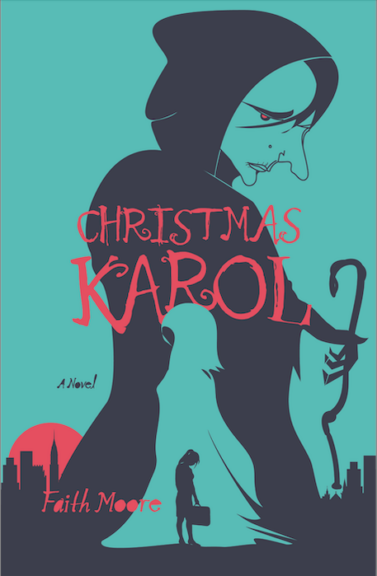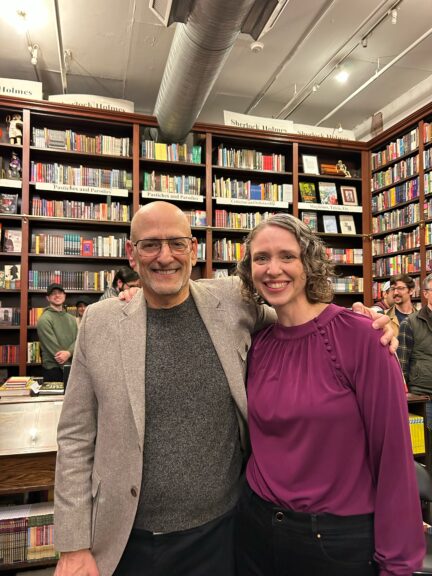Just in time for the holiday season, author Faith Moore is releasing her debut fiction novel that’s based on one of the most beloved Christmas tales of all time.
“Christmas Karol” provides a refreshing antidote to the confusion and cultural chaos that plagues the world right now. The story’s heroine is Karol, a woman grappling with her role as a woman and a mother. Through the course of extraordinary events, including a visit from ghosts, she realizes what truly matters in life.
“Christmas Karol,” a modern twist on Charles Dickens’s “A Christmas Carol,” follows Karol on her journey through her past, present, and future all to discover an eternal truth: It is far better to have what matters than to have it all. It takes a frank look at motherhood in the modern age and what it means to embrace the worthy work of raising children.

DW Books.
Moore is a freelance writer and editor and — most importantly — a stay-at-home mom. She has been published in the Wall Street Journal, New York Daily News, Federalist, and Daily Wire, among others. She is the author of the non-fiction book, “Saving Cinderella: What Feminists Get Wrong About Disney Princesses” and “How to Set It Right.”
Faith took time away from her busy schedule to answer some questions about “Christmas Karol” including her inspiration and her goals for publishing this type of book right now.
Q: Why this novel?
Every year at Christmastime, my family sits down to watch the Alastair Sim version of “A Christmas Carol.” It’s something we’ve done since I was a kid, so at this point, the story is sort of imprinted on my heart. It’s part of our family lexicon and has become a kind of shorthand for us for a variety of different emotional experiences. So it makes sense that I reached for it when I wanted to tell a story about motherhood, a topic which, for me, is filled with emotion.
Being a mom is the great joy of my life. I often say it’s not my job, it’s my vocation. It’s the thing I feel most called to do. But there was a time when I wasn’t sure it would happen for me. I suffered a miscarriage and various infertility struggles but, in the end, I had my two beautiful boys. “Christmas Karol” is, in some ways, a story about gratitude. About what a gift it is to be a mother and the ways in which we sometimes forget to be thankful for it.
Q: What attracted you to the classic “A Christmas Carol”? What makes it a good fit for this generation of women?
“Christmas Karol” is a modern retelling of Charles Dickens’s “A Christmas Carol” in which the Scrooge character has been reimagined as a workaholic mom named Karol whose miserliness is not about her money but about her time — how much time she chooses to spend (or not spend) with her family.
I think this notion of being given the chance — as Scrooge is, and as Karol is — to take a step back and view your life and your choices from the outside could be really powerful for women today. The wonderful thing about the Scrooge narrative is that, even though he goes through this huge supernatural experience, all the material things are still the same at the end of it. He’s still an old man, his fiancé is still long gone, his nephew grew up without him. But his perspective has shifted and that changes everything.
I think women today are being sold a narrative that, in order to be valuable or successful, they have to work outside the home. And many women structure their lives around that narrative without questioning whether that’s really the right narrative for them. We could all do with a bit of a Scroogian shift, in my opinion.
Q: How did this story come to you? What was the moment of inspiration?
The idea for “Christmas Karol” came to me at Christmastime at the tail end of the pandemic. I’ve been a stay-at-home mom since my first son was born nearly nine years ago, but during the pandemic, all the working parents suddenly came home. And there was a lot of talk about how impossible it was to parent full-time and work full-time.
The myth of “having it all” was being exposed in real time. But there was another, more surprising thing I was hearing from these parents: how wonderful it was to spend so much time with their kids. They were experiencing their kids in new ways, seeing them in a new light, and they were really enjoying it. But then the pandemic ended and everyone went back to work.
So, that Christmas, after our yearly viewing of the “Christmas Carol” movie, I started to think: what would it take for those parents to take that realization of what they were missing when they were going off to work and actually do something about it?
Q: What do you believe are the biggest challenges facing modern working women?
Feminism has sold women the lie that they can “have it all.” We are supposed to work full time and parent full time and enjoy it. But that’s impossible. You can’t be in two places at once. But women are treated as if they can.
Society tells them that it’s the job and how they perform at it that’s the measure of their success and value. This leads to a sense of resentment toward their children. If work is the thing that matters, then all their children’s needs are just a distraction. And there’s no wiggle room — no acknowledgement that perhaps a woman may want to take some time to stay home with her kids when they are young — built into the system for women. It leads to a lot of heartache, anger, and guilt.
Q: Your father, Andrew Klavan, is a famous novelist. Have you picked up any writing techniques from him?
My father taught me that telling stories is something you could actually aspire to do when you grow up. But, even more than that, he taught me that it was a job, and that was really huge.
So often we think of writers as these undisciplined artists who work when the muse strikes and sit around moodily in coffee shops the rest of the time. But my dad showed me that it’s work, just like anything else. You have to be thoughtful, methodical, and meticulous, and you have to put in the time. That’s been so helpful to me. It meant that I was able to write this book even though I only had an hour or so a day while my toddler was napping.
I know how to work. My dad taught me that.

Courtesy: Faith Moore & Andrew Klavan.
Q: How would you explain the power of fiction to touch the human heart?
Humans make sense of the world through metaphor and emotion. Stories help us understand things we wouldn’t otherwise be able to articulate. It’s why Jesus told parables. We inherently understand something better when we live it alongside the characters in a story.
If you’re doing it right, fiction doesn’t tell you what to think or what to believe or even how to feel. It’s not an argument or a manifesto. It’s an entire world in which themes and metaphors and humanity coalesce to make something that touches us each differently based on who we are. In a world where everyone is telling us what to think, we need stories more than ever.
Q: Who are your literary inspirations?
My favorite living author is Curtis Sittenfeld. She writes with the sort of crystalline simplicity that is nearly impossible to do well, and her characters are so well drawn it hurts. She wrote a book called “Eligible” which is a modern retelling of “Pride and Prejudice” and served as a bit of an inspiration for “Christmas Karol.” My favorite author of all-time is Charlotte Brontë. In my stories, I’m always going for the level of passion and emotional resonance that Brontë gives us in “Jane Eyre.”
Q: What’s next? What do you think are some important stories that need to be told?
I’m fascinated by the fundamental differences between men and women and the ways they complement each other. I want to tell stories where women are strong because they are feminine and men are strong because they take care of them. I love using classic stories as frameworks for new and exciting stories. My next project is in its very early stages but is sort of “You’ve Got Mail” meets “Cyrano de Bergerac” meets “Kate & Leopold.” Stay tuned!
Q: Your favorite Christmas story?
“A Christmas Carol,” of course!
* * *
The novel “Christmas Karol” released November 7, 2023, and is now available.

Continue reading this exclusive article and join the conversation, plus watch free videos on DW+
Already a member?

.png)
.png)

